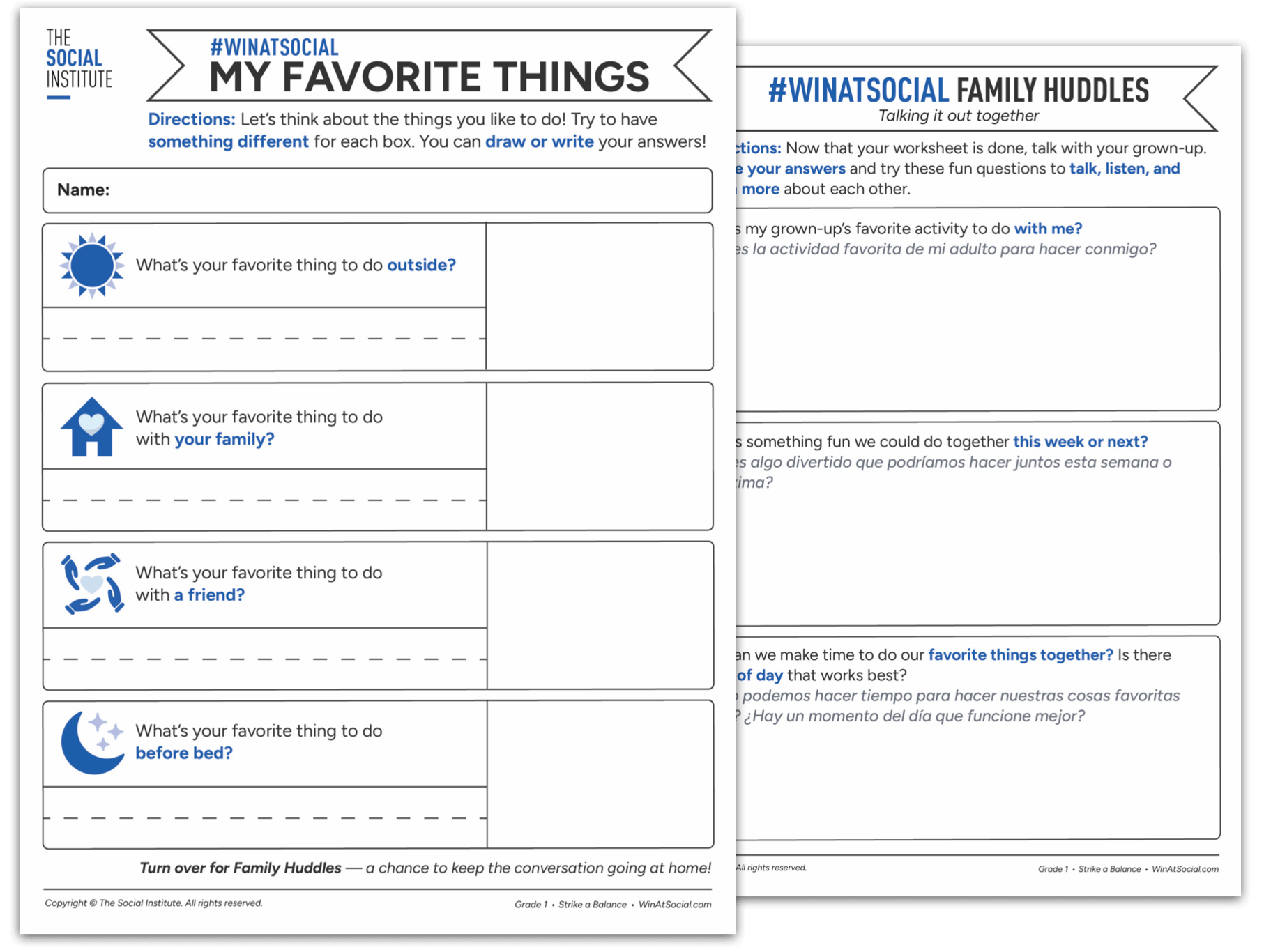Future-Ready from the Start: The Top Skills K–2nd Graders Need in a Modern World
Key points summarized
|
In today’s tech-fueled world, not every kindergartner is swiping or scrolling, and that’s okay. Families set different expectations around device use, especially in the early years. But eventually, every student will encounter tech like tablets, phones, social media, A.I., and the complex choices that come with them.
That’s why building the life skills they’ll need before those moments arrive is essential in setting students up for success, even from a young age. Skills like making thoughtful choices, showing kindness, and managing big emotions aren’t just nice to haves, they’re the new foundation for thriving in school, relationships, and our modern world.
That’s why The Social Institute is proud to launch brand-new K–2 Offline Lessons that build character, strengthen habits, and lay the groundwork for future success with no screens required.

Why start building modern life skills in K–2?
Students in kindergarten through second grade are like sponges, soaking up not just academic lessons, but also social cues, emotional habits, and values that will guide them for years to come.
“We are observing children gaining access to devices as early as two and three years old. Implementing a curriculum that teaches even our youngest learners how to manage distractions, explore technology responsibly, and identify potential pitfalls will undoubtedly contribute to their long-term success,” says Dr. Jessica Anderson, child psychologist.
This is the perfect window to start building modern life skills, including:
1. Thoughtful Decision-Making
From choosing how to treat a classmate to deciding what to do when something feels unfair, K–2 students face real decisions every day. The Social Institute’s K-2 Lessons help young learners practice making thoughtful choices that reflect who they want to be, now and in the future. Thoughtful decision-making can look like:
- Stopping to think before acting, using fun “Pause & Choose” moments.
- Asking, “Does this choice show the kind of friend or classmate I want to be?”
- Role-playing real-life situations, like what to do if someone is left out or if someone breaks a rule
2. Empathy and Kindness
Understanding how others feel and responding with care is essential for thriving in school, online, and in life. These early lessons promote kindness, teamwork, and respect, helping students build positive relationships with friends, teachers, and family members. Empower your K-2nd graders to:
- Learn how to recognize feelings by noticing faces, voices, and body language.
- Use kind words like “Are you okay?” or “Do you want to play?”
- Work together through activities that highlight sharing, listening, and celebrating others.
3. Handling Emotions
Big feelings are part of growing up. Through simple, developmentally appropriate activities, students learn how to recognize their emotions, express themselves, and practice strategies that boost focus and well-being. We can equip young learners to handle their emotions by helping them:
- Practice naming their feelings (“I feel ___ because ___”).
- Try calming strategies like deep breathing, movement breaks, or talking to a trusted adult.
- Connect emotions to actions in healthy ways.
4. Healthy Habits
Getting enough sleep, limiting screen time, spending time outside, and asking for help when we need it are all healthy habits that students as young as kindergarten can learn. These new lessons introduce foundational habits that align with students’ health, happiness, and goals. You can start today by:
- Talking about screen time tradeoffs: “What can I do instead of more screen time?”
- Encourage them to track good sleep routines.
- Showing them the power of getting outside, eating well, and asking for help when they need it.
5. Character and Confidence
When students see themselves as capable, kind, and in control of their actions, they build the confidence to take on new challenges. Our screen-free lessons encourage each child to be their best self, whether they are on the playground, in the classroom, or at home. Empower your K-2nd graders to:
- Reflect on what makes them proud of themselves, no matter how small a victory!
- Celebrate classmates through their own accomplishments.
- Set mini goals and practice trying new things, even if they’re tricky.
Screen-Free, Student-Inspired K-2 Lessons
These lessons are designed for students, not just about them. Created with elementary educators, family members of K-2 graders, child development experts, and K–2 learners themselves, each activity is:
- Fun and unplugged – no screens or tech tools required
- Quick and easy to implement – Educators can just print and go
- Connected to home – each worksheet includes a simple Family Huddle so families can continue these important conversations after the school day
Starting early means students build the skills they need before they face bigger online and offline challenges. Request a demo of The Social Institute’s K-2 Offline Lessons today to start helping even your youngest students make thoughtful choices now, setting them up for success later.
Partnered with The Social Institute, but don’t have access to K-2nd grade Lessons? Learn how you can expand your impact to support your high school students >>
The Social Institute (TSI) is the leader in equipping students to navigate learning & well-being in a tech-fueled world. Through #WinAtSocial, our interactive, peer-to-peer learning platform, we empower students, educators, and families to make high-character choices online and offline. #WinAtSocial Lessons teach essential skills while capturing student voice and actionable insights for educators. These insights help educators maintain a healthy school culture, foster high-impact teaching, and build meaningful relationships with families. Our unique, student-respected approach empowers and equips students authentically, enabling our solution to increase classroom participation and improve student-teacher relationships. Through our one-of-a-kind lesson development process, we create lessons for a variety of core and elective classes while incorporating timely topics like social media, A.I., screen time, misinformation, and current events to help schools stay proactive in how they support student health, happiness, and academic success.
